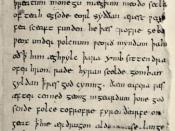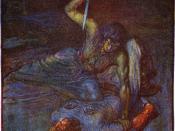Can every hero do everything on his own? From comic superheroes like Batman and Robin to athletes like Michael Jordan and Scottie Pippin, the second banana has always been there to support the lead character. Depending on the situation, the contributions from a sidekick can be very beneficial but the need for one can also be in question. Heroes achieve success when they effectively complete quests and deal with adversity in addition to performing civic justice for the people who look up to them. Those three criteria's determine whether a sidekick is beneficial for heroes like Gilgamesh and Beowulf.
Success in quests can often determine a hero's status in a society. In the Gilgamesh story, both Gilgamesh and Enkidu embark on a journey to kill Humbaba, the guardian of the Cedar forest that is forbidden to mortals. Together, the duo manages to successfully complete the quest as both provide support to each other when needed.
During the journey, when both of them get frightened of facing Humana in battle, they each reassure themselves that they can defeat the beast. Enkidu's death causes Gilgamesh to embark on another quest where he hopes to find eternal life like Utnapishtim. Unlike the previous quest where Gilgamesh had Enkidu, Gilgamesh did not have an assistant to help him through his quest. In the end of his solo journey, he returns to his kingdom, unsuccessful in retrieving the elixir that he sought after. Beowulf goes on a mini-quest as he travels to the underwater lair of Grendel's mother to avenge Aeschere's death. The courageous Beowulf dives and reaches the underwater lair and successfully kills Grendel's mother. Beowulf manages to defeat the beast without any outside help from his warriors compared to Gilgamesh who needed support for Enkidu during his quest.
Performing civic justice for people...


